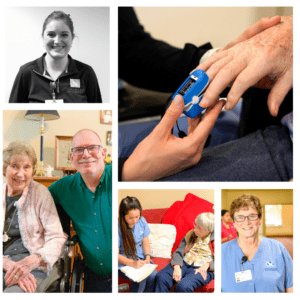This article was put together from a podcast recorded by Charles Bryce, CEO of Charlin Health Services. Charles is joined by Kathleen Fallon, a chaplain for Charlin Health. Listen to the podcast here.
The article focuses on the process of grief associated with health care, specifically home health, hospice, and personal care, focusing on the geriatric population. Hospice care can be scary for both patients and their families. What are ways people can deal with grief?
The Process of Grief
End-of-life care and the hospice process can be an emotional rollercoaster. Feelings can range from comfortable to extreme. Some of the feelings make us want to run away, while others won’t stop running through our minds. Many people need help dealing with end-of-life-associated grief, but may choose (consciously or not) to stay in a stage of denial.
The truth is, however, grief never goes away, so it must be dealt with at some point. Talking and healing is needed to fully come to terms with most symptoms of grief. Finding the best person to talk to can be difficult.
While some people have great relationships with spiritual or religious leaders, others don’t have someone readily available. In the latter situation, the best place to start is to find someone close to you who will listen to your thoughts and feelings. A person you are comfortable with and who you know won’t share your personal feelings with others.
Individualized Grief
Finding the best person to talk to regarding your feelings and mental health can be difficult. This is due to grief being deeply individualized and personal. Two different people could lose their mother or father and have completely different grieving processes.
It is for this reason that talking to a person close to you first can be beneficial. A trustworthy friend or neighbor can listen and give you feedback on what your next steps may need to include. The best option for many people can be talking to a friend or in-law who has experienced a similar loss. Listening to how other people dealt with similar situations can be a great stating point for finding a proper outlet for grief.
Hospice Services
In end-of-life situations involving hospice care, chaplains and other healthcare professionals are there to help family members cope with grief and loss. These professionals can listen to you as an experienced impartial third party and give you suggestions and direction.
Charlin Health Services
At Charlin Health Services we pride ourselves on honor, integrity, excellence, compassion, dignity, and trust. If you have any needs or questions about health services, hospice care, or other medical needs, please send us an email or give us a call.



